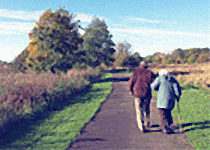
Stroke can lead to physical and functional deficits including paralysis, physical pain, emotional disturbances and difficulty swallowing, speaking or thinking. Although a number of specially designed rehabilitation programs exist that help stroke survivors recover as much of their strength and function as possible, patients and their caregivers often comment that the transition home can be the most difficult.
A team of researchers led by TRI Adjunct Scientist Dr. Jill Cameron demonstrated that allowing stroke survivors to go home for the weekend (on a "weekend pass") can inform their rehabilitation program and facilitate the transition home.
To gain insight into the impact of the weekend pass, the researchers interviewed patients, caregivers and their health care providers after the first weekend pass and four weeks after returning home. Researchers found that the weekend pass helped stroke survivors identify challenges at home that could be addressed in their rehabilitation programs prior to discharge from the hospital. It also helped caregivers understand the stroke survivors' abilities and better prepare for bringing their family member home. Moreover, the study revealed ways in which the current weekend pass could be modified to better meet the needs of patients and their caregivers.
Dr. Cameron comments, "Enhancing the process for the weekend pass is one way to help patients and families manage one of the most challenging of transitions within the health care system—the transition home."
This work was supported by the Ontario Stroke Network.
Stroke survivors', caregivers', and health care professionals' perspectives on the weekend pass to facilitate transition home. Cameron JI, Bastawrous M, Marsella A, Forde S, Smale L, Friedland J, Richardson D, Naglie G. J Rehabil Med. 2014 Aug 28. [Pubmed abstract]


Comments